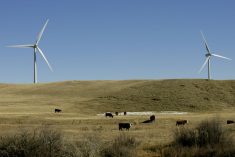A bill to exempt propane and natural gas from the carbon price when used for grain drying and barn heating was nearing the end of its winding road through the Senate after an Oct. 5 meeting.
Thursday morning the Senate’s committee on agriculture and forestry heard final witnesses speak on Bill C-234, which would amend the Greenhouse Gas Pollution Pricing Act to expand farm-related carbon price exemptions.
At the committee’s next meeting on Oct. 17, it will consider potential amendments before returning it to the senate chamber where they will debate the bill again before a third reading.
Read Also

International trade minister visits Singapore, Vietnam
Canada’s minister of international trade met with Vietnam and Singapore government officials to emphasize the need for free trade, highlight Canadian agri-food products, and to announce projects aimed at strenghtening trade with those nations.
If the bill is amended, it will return to the House of Commons to be reviewed again before being given royal assent and becoming law.
In June, the Keystone Agricultural Producers, the Alberta Federation of Agriculture and the Agricultural Producers Association of Saskatchewan (APAS) urged the Senate to pass Bill C-234 before Parliament’s summer break.
The bill, first introduced in the House of Commons in November 2021, passed its second reading in the Senate on June 13. The Senate rose for summer on June 30.
Witness statements
The Sept. 26 meeting heard from representatives of the Agriculture Carbon Alliance, which is a coalition of 15 farm groups, the Grain Growers of Canada, the Ontario Agri Business Association, the Climate Action Network, the David Suzuki Foundation and a professor from the University of B.C.
Two days later, the committee heard from representatives of the National Farmers Union, Saskatchewan’s general farm group (APAS) and an academic from the University of Ottawa. They also heard from civil servants regarding the cost of the proposed exemptions.
Proponents of the bill told the committee that farmers have no choice but to use machinery fueled by natural gas and propane to dry their grain, as viable alternatives don’t currently exist. Arguments focused mainly on grain drying, making little reference to heating farm buildings.
Russel Hurst, executive director of the Ontario Agri Business Association, made a bid to have grain drying at commercial grain elevators included in the exemption. He told the committee that, unlike in the West, many Ontario farmers pay to have their grain dried at the elevator. The elevator then passes on the cost of the fuel, including the carbon price, to farmers.
Senator Paula Simons said one could argue all businesses do that, and Hurst conceded this was fair.
Black asked if it was worth amending the bill to include grain elevators, at the risk of the bill not passing. Dave Carey and Scott Ross, co-chairs of the Agricultural Carbon Alliance, and Kyle Larkin, executive director of the Grain Growers of Canada, said it was not worth the risk.
“We’ve been waiting for years,” Larkin said.
Hurst said they aspired to have legislation that suited all growers.
Other witnesses suggested that exempting fuels from the price on carbon would remove farmers’ and equipment manufacturers’ incentive to switch to cleaner technology.
B.C. researcher Kathryn Harrison argued that exemptions undermine the effectiveness and fairness of the price on carbon and added that she was concerned that this wouldn’t be the last exemption.
Tom Green, who represented the David Suzuki Foundation, argued that “every sector can come up with their own reason for why they deserve relief.”
Carey rebutted that farmers want to innovate, and the eight-year sunset clause currently built into the bill would give a deadline to farmers and equipment providers, pushing them to develop new solutions.
University of Ottawa associate professor Nicholas Rivers said that while, “there are legitimate concerns that the carbon price puts Canadian grain farmers at a [competitive] disadvantage,” completely exempting fuels from the carbon price would remove the price signal that incentivized improvement. Murray Jowett, who represented the National Farmers Union, agreed.
Simons questioned whether returning money to farmers was the right tactic at all. She asked the witnesses if it would be better to put the money toward green technology development.
The senators also considered if the current rebate program needs to be more targeted. It currently pays out farmers based on their farm expenses, which aren’t necessarily tied to grain drying or heating buildings.
The rebate program has been panned by agriculture groups for being inequitable.
Senator Yuen Pau Woo asked whether the rebate could be targeted toward farms more affected by the carbon price on natural gas and propane.
Rivers said a better rebating system, such as an output-based system similar to those for large industrial emitters, would alleviate the cost to farmers while still providing some incentive for innovation.
The committee also met Oct. 3 where it heard from representatives of the Canadian Federation of Independent Business and the Saskatchewan Association of Rural Municipalities.
During the Oct. 5 meeting, senators heard from a professor from the University of Guelph’s engineering department, and the senior research chair for agricultural engineering and technology from Lethbridge College. Both were questioned about available clean grain drying technology.
–Geralyn Wichers reports for the Glacier Farmmedia network from Steinbach, Man.














